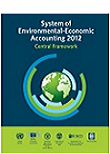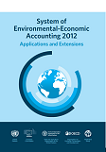An international statistical standard for measuring the environment and its relation to the economy Read More
Data
National Data
Dozens of countries in all regions of the world compile SEEA accounts on a regular basis. The accounts compiled vary based on the priorities of the countries, as well as the available data. The SEEA library contains accounts published by countries over the years and can be accessed here. A summary of the current status of the SEEA implementation can be found in the results of the 2020 Global Assessment.
International Databases
The UNCEEA has been tasked by the UN Statistical Commission to explore the the creation of global databases for various SEEA Central Framework and SEEA Ecosystem Accounts. A number of international organisations, including Eurostat, FAO, OECD and UN Environment, are working in close collaboration with the UNCEEA and UNSD on compiling global databases. Global data structure definitions for the select SEEA Central Framework accounts have been established and can be found here.
Progress is ongoing, but currently the following databases are available for the SEEA Central Framework:
- The UN Environment International Resource Panel Global Material Flows Database for global material flows
- Regional databases for the European Union, which are compiled by Eurostat. Databases exist for air emission, physical flow accounts for energy, material flows and resource productivity, environmental taxes, environmental protection expenditures, and environmental goods and services sector accounts. Eurostat also compiles environmental footprint databases.
- Air emission accounts, compiled by OECD
- Estimated air emission accounts for select countries, produced by OECD
- Land cover and land use data, compiled by FAO
For the SEEA Ecosystem Accounting, UNSD, in collaboration with the UN Environment Programme and Basque Center for Climate Change (BC3), have developed the ARIES for SEEA Explorer. The ARIES for SEEA Explorer uses artificial intelligence to enable rapid and standardized yet customizable ecosystem accounting for terrestrial ecosystems, consistent with the SEEA Ecosystem Accounting at different scales anywhere on Earth. ARIES for SEEA is available on the UN Global Platform: a cloud-service platofrm to support international collaboration in the development of official statistics using new data sources and innovative methods. Visit and find out more about the ARIES for SEEA Explorer here.
Global data collection
The global data collection for the System of Environmental-Economic Accounting (SEEA) focuses on the Physical Energy Flow Accounts (PEFA) and Air Emission Accounts (AEA) and marks an important achievement for the United Nations Committee of Experts on Environmental-Economic Accounting (UNCEEA) towards the establishment of global databases for the System of Environmental-Economic Accounting (SEEA). If you would like to know more about the data collection programme, visit here.
SEEA Central Framework

SEEA Ecosystem Accounting

A measurement framework tracking changes in ecosystems and linking those changes to economic and other human activity Read More
SEEA Applications and Extensions

How to use the SEEA Central Framework accounts for decision making, policy formulation and research Read More

